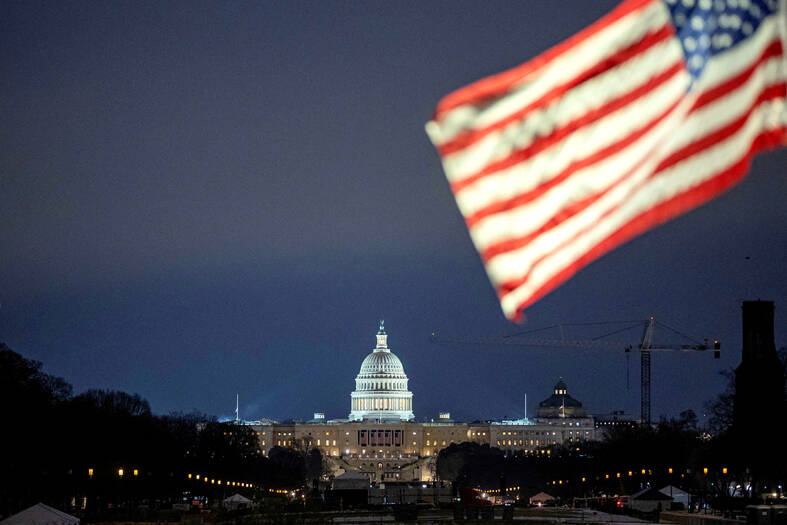They increasingly own everything from access to space to how we get news on Earth and now outgoing President Joe Biden warns America’s new breed of Donald Trump-allied oligarchs could gobble up US democracy itself.
Biden used his farewell speech to the nation to deliver a shockingly dark message: that a nation which has always revered its entrepreneurs may now be at their mercy.
“An oligarchy is taking shape in America of extreme wealth, power and influence that literally threatens our entire democracy, our basic rights and freedoms,” Biden said.

Photo: Reuters
He named no names, but his targets were clear: men like Elon Musk — the world’s richest person — who surround incoming Republican president Trump.
That “dangerous concentration of power in the hands of a very few ultra-wealthy people” will have “dangerous consequences if their abuse of power is left unchecked,” he said.
And echoing president Dwight Eisenhower’s own farewell warning in 1961 about the dangers of an out-of-control military industrial complex, Biden flagged the “potential rise of a tech industrial complex” — referring to the Silicon Valley titans behind transformational advances in AI and robots.
Biden’s pulling of the alarm cord as he goes out the door can be chalked up to politics. But there’s no disputing the fact that America’s uber-wealthy and fantastically ambitious tycoons are swarming around Trump.
A PLACE ON THE DAIS
On Inauguration Day on Monday, several of the biggest will sit feet away from Trump on the presidential dais.
Chief among them is Musk, whose wealth is estimated by Forbes to be US$435 billion, and who has been named to a high-profile position in charge of cutting government spending.
After helping to bankroll the campaign against Kamala Harris, Musk has become a fixture in the inner circle, appearing at more public dinners and other events with Trump than the president-elect’s wife Melania.
As owner of SpaceX, Musk is already one of the biggest US government contractors, and as owner of Tesla, he’s at the forefront of the US push to win the e-vehicle race. As owner of social media site X, he has turned the platform into a bullhorn for voices that favor Trump.
Amazon CEO Jeff Bezos and Meta CEO Mark Zuckerberg — second and third on Forbes’ global rich list — will also be on the dais.
Bezos, vying to rival Musk in the space contracting business, loudly signaled his decision to cozy up to Trump just before the election when he killed an endorsement by his newspaper, The Washington Post, of Harris.
Zuckerberg, who once banned Trump from Facebook because of his role in attempts to overthrow the 2020 election, recently dined with Trump and is reportedly hosting a reception for Republican billionaires at the inauguration — which he has also helped fund to the tune of US$1 million.
More consequentially: Zuckerberg last week announced that Facebook and Instagram will get rid of an army of fact checkers in the US — long demonized as liberal censorship by Trump and his allies.
According to US media, Shou Zi Chew (周受資), the head of another controversial and massively influential platform — Chinese-owned TikTok — has also been invited to the inauguration.
OLIGARCHY US-STYLE
The presence of the super-rich in politics is neither new nor confined to the US.
In Russia, oligarchs in the wild 1990s first bought up the economy, then the government, before being forced into a more regulated partnership with the Kremlin under Vladimir Putin.
Business figures have also entered deep into politics in countries as varied as India and communist China.
But Lorenzo Castellania, a history professor at Rome’s Luiss University, says the US has distinct oligarchical traditions.
“I don’t think it is fair to compare Musk to the oligarchs of authoritarian regimes. I think instead he fits into a very American historical typology such as the robber barons who appeared on the political scene in the late 19th and early 20th century,” Castellania said.
Although the likes of Andrew Carnegie and JP Morgan wielded enormous influence over US democracy, they also created untold wealth for the economy, leaving legacies ranging from soaring public buildings to entire industries.
But the Gilded Age was almost a century and a half ago. How will it work this time?
Castellania says the seemingly ironbound Trump-Musk partnership may contain two fatal flaws.
First, “both have a huge ego” and “the chances of friction being generated in the long run are high.”
Secondly, something deeper: Trump’s electoral base wants less immigration and more isolationism, while Musk and the “tech industrial complex” have global — even inter-planetary — visions.
“One of the most interesting questions of this new administration,” Castellania said, “will be to see whether or not this coexistence will endure.”

Taiwan doesn’t have a lot of railways, but its network has plenty of history. The government-owned entity that last year became the Taiwan Railway Corp (TRC) has been operating trains since 1891. During the 1895-1945 period of Japanese rule, the colonial government made huge investments in rail infrastructure. The northern port city of Keelung was connected to Kaohsiung in the south. New lines appeared in Pingtung, Yilan and the Hualien-Taitung region. Railway enthusiasts exploring Taiwan will find plenty to amuse themselves. Taipei will soon gain its second rail-themed museum. Elsewhere there’s a number of endearing branch lines and rolling-stock collections, some

The Democratic Progressive Party (DPP), Chinese Nationalist Party (KMT), and the country’s other political groups dare not offend religious groups, says Chen Lih-ming (陳立民), founder of the Taiwan Anti-Religion Alliance (台灣反宗教者聯盟). “It’s the same in other democracies, of course, but because political struggles in Taiwan are extraordinarily fierce, you’ll see candidates visiting several temples each day ahead of elections. That adds impetus to religion here,” says the retired college lecturer. In Japan’s most recent election, the Liberal Democratic Party lost many votes because of its ties to the Unification Church (“the Moonies”). Chen contrasts the progress made by anti-religion movements in

Could Taiwan’s democracy be at risk? There is a lot of apocalyptic commentary right now suggesting that this is the case, but it is always a conspiracy by the other guys — our side is firmly on the side of protecting democracy and always has been, unlike them! The situation is nowhere near that bleak — yet. The concern is that the power struggle between the opposition Chinese Nationalist Party (KMT) and their now effectively pan-blue allies the Taiwan People’s Party (TPP) and the ruling Democratic Progressive Party (DPP) intensifies to the point where democratic functions start to break down. Both

This was not supposed to be an election year. The local media is billing it as the “2025 great recall era” (2025大罷免時代) or the “2025 great recall wave” (2025大罷免潮), with many now just shortening it to “great recall.” As of this writing the number of campaigns that have submitted the requisite one percent of eligible voters signatures in legislative districts is 51 — 35 targeting Chinese Nationalist Party (KMT) caucus lawmakers and 16 targeting Democratic Progressive Party (DPP) lawmakers. The pan-green side has more as they started earlier. Many recall campaigns are billing themselves as “Winter Bluebirds” after the “Bluebird Action”